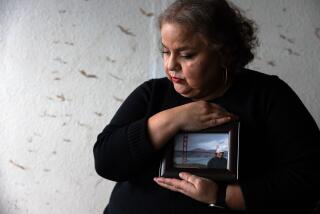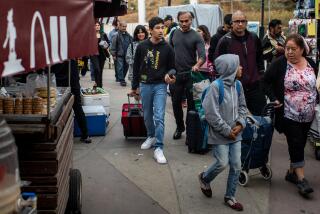Tashfeen Malik got resident status via marriage. What does that mean for visas -- and Syrian refugees?
The woman who helped kill 14 people at a holiday party in San Bernardino on Wednesday arrived in the United States last year on a special visa reserved for the fiancés of U.S. citizens.
Tashfeen Malik, who was born in Pakistan, gained legal permanent resident status last year after she married Syed Rizwan Farook, her co-conspirator in Wednesday’s deadly shooting.
The attack has brought new attention to the previously obscure K1 visa program, with some advocates for stricter immigration enforcement calling for investigations into the nation’s visa screening process and calling for the U.S. to halt its Syrian refugee program.
Follow live coverage of the San Bernardino shooting >>
“New information coming to light regarding Tashfeen Malik’s citizenship reaffirms the fact that proper screening and vetting those coming into our country, whether with a visa or as a refugee, is not always possible,” said Dan Stein, president of the Federation for American Immigration Reform, which advocates for stricter immigration laws.
On Thursday, U.S. Sens. Ted Cruz (R-Texas) and Jeff Sessions (R-Ala.) released a letter demanding that the Obama administration release the immigration histories of Malik, her husband and their families in advance of a Congressional vote on a bill that includes funding for the Syrian refugee and other immigration programs.
After last month’s terror attacks in Paris, they and other congressional Republicans have threatened to amend the must-pass spending bill to keep the government running with restrictions that would in effect halt the resettlement of refugees from Syria and Iraq to the U.S.
The K1 visa permits the foreign-citizen fiancé of a U.S. citizen to travel to the U.S. and marry his or her sponsor within 90 days of arrival. It is one of dozens of visas that allow foreigners to enter the U.S.
State Department spokesman Mark Toner said Thursday that K1 applicants, like other visa applicants, undergo an extensive counterterrorism screening that includes checks based on fingerprints and facial recognition software.
“Since 9/11, all of these involve multiple layers of vetting with multiple agencies putting folks through various systems, where we watch individuals, what their affiliations are, whether they’re on any kind of watch lists,” Toner said in a news briefing Thursday. “All of this is done for any visa applicant.”
Toner said the screening process for the refugee program is even more comprehensive. “It’s longer in duration, it’s a more thorough vetting,” he said.
Whereas K1 visas often take around six months to process, it can take anywhere from 12 to 18 months for refugees to be approved.
Maurice Goldman, an immigration attorney in Tucson, Ariz., with extensive experience handling K1 visas, said the screening process is robust but cannot protect against everything, including radicalization after being admitted to the U.S.
“If someone has a perfectly clean record and absolutely no evidence of ties to terrorist groups or organizations … how do you detect that all of a sudden they are going to leave their 6-month-old and go put body armor on and thousands of rounds of ammunition and go shoot up a facility like they did?” Goldman said.
“It’s one of those scenarios where we can always second-guess how the process works and I don’t know if there is a perfect process,” he said. “We live in a global environment and we are in a nation of immigration and a lot of our lifeblood depends on the entries and exits of foreign nationals.”
Immigrant advocates rallied on Thursday, saying the attacks in San Bernardino should not be used to scapegoat all immigrants.
“We call upon all Californians to stand against scapegoating and ensure that the horrible actions of a few are not used to scapegoat entire communities who are a fundamental part of our state and nation,” said Reshma Shamasunder, executive director of the California Immigrant Policy Center.
Twitter: @katelinthicum
Twitter: @theCindyCarcamo
MORE ON SAN BERNARDINO
Who the victims of the San Bernardino shooting were
‘It was unspeakable, the carnage,’ says first San Bernardino officer to arrive
Police tactics in San Bernardino rampage win high praise from experts
More to Read
Sign up for Essential California
The most important California stories and recommendations in your inbox every morning.
You may occasionally receive promotional content from the Los Angeles Times.












